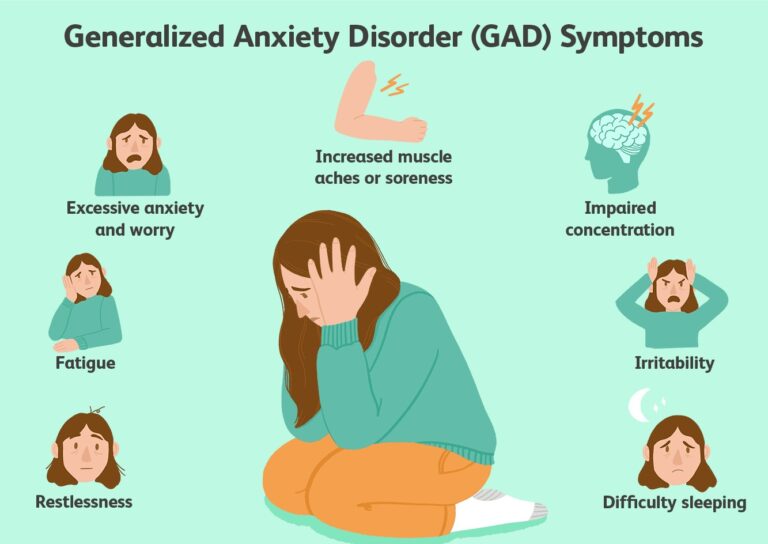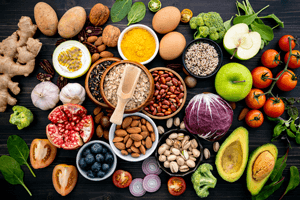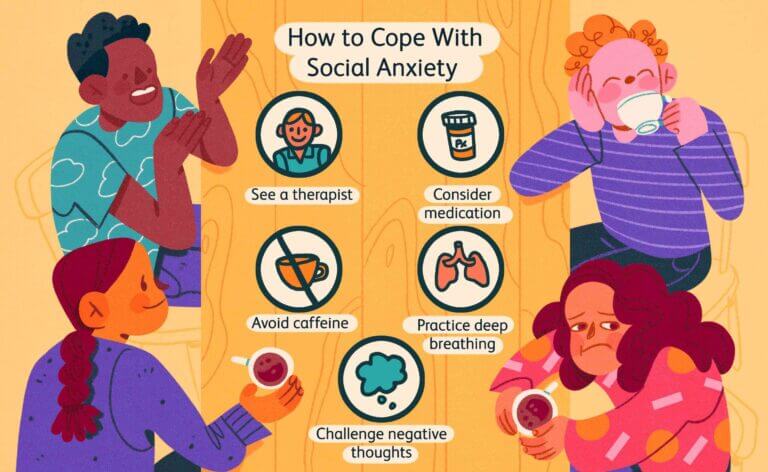ANXIETY AND DIET
The most common issue people face in today’s difficult time such as pandemics is stress and anxiety. Majorly people focus on their physical health but tend to ignore or even discuss mental health issues. Mental health issues impact the body in many ways which might trigger a major lifestyle disorder.

Anxiety is an emotion resulting from stress, tension, or worried thoughts due to something out of a person’s comfort zone. If you have changed in your comfort zone the brain releases adrenalin (a hormone) that triggers anxiety. These emotions might subside with time or with the change of situation but when they don’t subside but intensify, leads to anxiety disorder. People of any age might get affected by this mental disorder.
Usually, anxiety leads to numerous physical symptoms like increased blood pressure and nausea, irritable bowel syndrome, insomnia, increased heart rate, etc. Food helps in uplifting mood, maintaining a healthy gut, removing toxins from the body as well as increasing immunity.
ANXIETY AND ITS RELATED SYMPTOMS
Anxiety arises from various reasons including feelings of fear, dread, and uneasiness. These feelings might have physical responses such as sweat, feeling restless and tense, and having a rapid heartbeat. This can be a normal stress reaction and you might feel anxious when faced with a difficult problem at work, before taking a test, or before making an important decision. Diet plays an important role in helping you cope with anxiety and its symptoms. Sometimes, anxiety may give you a boost of energy or help you focus.
In severe cases of anxiety, there might be interference in your day-to-day activities or enjoyment of life. Thus, you should consult a psychotherapist who might prescribe medication or other treatment options.

People with anxiety experience various signs and symptoms that may include:
- Feeling of nervousness, restlessness, or tension.
- A sense of forthcoming danger or doom leads to panic.
- Increased heart rate
- Rapid breathing or hyperventilation
- Sweating
- Trembling
- Feeling weak or tired
- Trouble concentrating or thinking
- Having trouble sleeping
- Experiencing gastrointestinal (GI) problems
- Difficulty controlling worry
- Severe urge to avoid things that trigger anxiety
IMPORTANCE OF FOOD IN ANXIETY DISORDER
Your worries may not go away on their own, and they may get worse over time if you don’t seek help. Anxiety symptoms can make you feel unwell. Coping with anxiety is often challenging and requires lifestyle changes. There aren’t any diet changes that can cure anxiety, but watching what you eat may help.

A diet rich in whole grains, vegetables, and fruits is a healthier option in comparison to simple carbohydrates found in processed foods. What you eat has a great impact on your anxiety and related symptoms. It is important to not skip your meals as it may result in drops in blood sugar making you feel jittery, which may worsen underlying anxiety.
- Increase protein content – the protein in the diet helps in feeling full faster but it gets digested slowly. It releases a steady amount of sugar in the blood which helps in providing energy for a longer time as well as maintains blood sugar levels in the blood. Protein in eggs is a rich source of essential amino acids like tryptophan that is important for the growth and development of the body, producing neurotransmitter serotonin which helps improve sleep and uplifts mood.
- Balanced vitamins and minerals in the diet – Vitamin C in the diet helps repair and protect cells, are rich in antioxidants which is useful in the reduction as well as prevention of anxiety. Vitamin B complex (pyridoxine, thiamine, riboflavin, and niacin) helps in the production of various neurotransmitters like serotonin that have a positive effect on the nervous system. People with a deficiency of these vitamins are more prone to anxiety disorder. Including nuts like almonds, Brazil nuts, etc., which are rich in Vitamin E is also proven to uplift mood. Minerals like magnesium found in almonds are effective in treatment for anxiety-related symptoms by releasing serotonin neurotransmitters. Zinc and potassium help regulate electrolyte levels, manage blood pressure as well as induce brain and nerve development. These not only help in reducing stress and anxiety but also symptoms related to anxiety disorder. Pumpkin seeds are a good source of both zinc and potassium.
- Complex carbohydrates – Incorporating food rich in complex carbohydrates like oatmeal, quinoa, barley, bran, whole-grain breads, and whole-grain cereals helps the serotonin receptors in the GI tract function properly which have proven to be linked to reducing the risk of chronic disease.
Taking an adequate amount of omega 3 fatty acids (from foods like chia seeds, salmon, etc.) helps in cognitive boost and mood enhancement which lowers anxiety. Omega 3 fatty acids provide the right fats to the brain to function properly. - Drink plenty of water – water removes toxins from the body which helps keep the body healthy. Also, dehydration might affect the mood which increases anxiety. Also, green tea helps in reducing anxiety as it contains L-theanine, an amino acid that has a positive effect on brain health and decreases cortisol levels.
- Limit alcohol as well as caffeine content – Alcohol and caffeine might make people calm initially but it hinders sleep which increases anxiety.
- Eating dark chocolate – Dark chocolate has anti-aging properties but it is also proven in reducing anxiety. It helps in improving blood flow to the brain thus promoting the ability to adapt to stressful situations. Chocolate helps as a mood buster that makes people happy by stimulating the happy hormones in the brain. Dark chocolate contains antioxidants and is proven to increase serotonin levels.
- Yogurt – Yogurt is comfort food as it maintains mental health, improves brain functions by inhibiting free radicals, damages nerve tissue in the brain, leads to anxiety, and produces neurotransmitters that make people happy. Yogurt contains Probiotics that are good at controlling anxiety.
Food has a great impact on anxiety, be it positive or negative. Changing food habits will help in reducing anxiety along with depression. Diet and exercise act as anti-stress elements which help cope with anxiety disorder.

OUTLOOK
Changes to your diet may make some difference to your general mood or sense of well-being, but they’re not a substitute for treatment. Lifestyle changes, such as improving sleep habits, increasing social support, using stress-reduction techniques, and getting regular exercise, also may help.
If you or anyone you know is suffering from anxiety, our expert providers at Specialty Care Clinics will take care of your health and help you recover.
Call us on (469) 545-9983 to book an appointment with our specialists.
